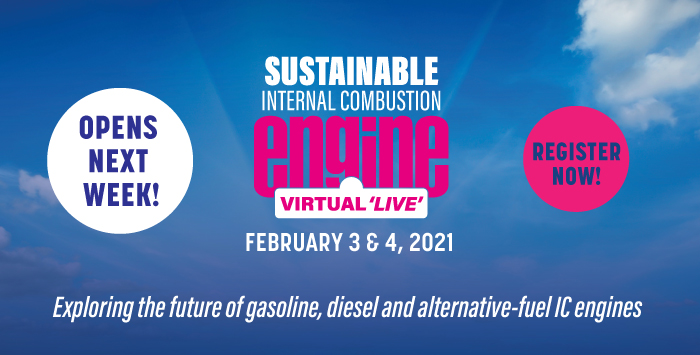The engine industry’s most important conference opens next week (Wednesday, February 3), providing a much-needed dedicated online platform to network, connect, learn and discuss how the traditional ICE powertrain should be developed and advanced beyond its current brief and design constraints to ensure a long and prosperous future.
The free-to-attend, two-day Sustainable Internal Combustion Engine Virtual ‘Live’ (February 3 and 4, 2021) will see expert speakers explore future concepts and technologies for the IC engine.
Dedicated sessions across the two days include Post-Pandemic Automotive Industry; Engine Development Beyond the Bounds of Current Technology; Effective Lubricants; The Transition to Euro 7 and Reduction in CO2 Emissions; Diesel Powertrains; Heavy-Duty Vehicles; Future Mobility; Advanced Components and Materials; Stepping Away From Fossil Fuels – all followed by live discussions and Q&A.
Participants can expect a highly rewarding and insightful exchange of ideas, with live interaction and networking fully enabled and encouraged during the event, which will take place online for maximum safety and convenience. Here are just a few of the highlights in store:
The role of the internal combustion engine in a net-zero future
 Ian Constance, CEO of the UK’s Advanced Propulsion Centre, will explore the opportunity for the internal combustion engine in a post-pandemic world, including the need to understand the opportunities and challenges facing our sector in the quest to deliver net-zero carbon targets. The internal combustion engine is likely to remain an important part of the solution as we decarbonize, but how does it fit within the mix and how should strategic priorities be considered?
Ian Constance, CEO of the UK’s Advanced Propulsion Centre, will explore the opportunity for the internal combustion engine in a post-pandemic world, including the need to understand the opportunities and challenges facing our sector in the quest to deliver net-zero carbon targets. The internal combustion engine is likely to remain an important part of the solution as we decarbonize, but how does it fit within the mix and how should strategic priorities be considered?
Combustion engines can outperform electric cars and achieve negative emissions
Dulob is developing one important part of the puzzle: a new patented thermodynamic cycle that will achieve diesel efficiency at just 10% of the diesel top pressure. This has the potential to solve NOx and particle problems, reveals Bengt Ovelius, CTO and founder of Dulob Innovations. The second part of the puzzle is interesting for every engine manufacturer. Mathematical analysis indicates that atmospheric methane has the potential to generate electricity for the entire EU, and fuel for cars and aviation. A reduction from 1.8ppm to 0.8ppm brings the atmosphere back to the year 1700. This reduces the greenhouse effect more than the sum of present global environmental policies.
Mahle passive jet ignition for high-efficiency and high-performance gasoline engine applications
 As part of the ‘Engine Development Beyond the Bounds of Current Technology’ session on Wednesday, February 3, Dr Mike Bassett, chief engineer at Mahle Powertrain, will discuss the pre-chamber-based jet ignition concept, which produces jets of partially combusted species that induce ignition in the main combustion chamber, enabling rapid, stable combustion. Dr Bassett shows how passive jet ignition, combined with high compression ratio, Miller cycle and EGR can provide high-efficiency engine operation. The ability of passive jet ignition to also enable whole map λ=1 operation for high-specific-power applications is also discussed.
As part of the ‘Engine Development Beyond the Bounds of Current Technology’ session on Wednesday, February 3, Dr Mike Bassett, chief engineer at Mahle Powertrain, will discuss the pre-chamber-based jet ignition concept, which produces jets of partially combusted species that induce ignition in the main combustion chamber, enabling rapid, stable combustion. Dr Bassett shows how passive jet ignition, combined with high compression ratio, Miller cycle and EGR can provide high-efficiency engine operation. The ability of passive jet ignition to also enable whole map λ=1 operation for high-specific-power applications is also discussed.
Future transportation without the internal combustion engine?
Hear two Ford leaders – director of global engine engineering Frank Abkenar and research and advanced engineering manager Carsten Weber – discuss the future of the internal combustion engine. Based on the fundamental laws of thermodynamics, the undiminished increase in the total engine efficiency is limited. This moves ‘what to burn’ instead of ‘how to burn’ into the center of interest. A very promising alternative to classic fuels based on fossil sources is the use of sustainable fuels produced on the basis of renewable energy. The majority of the next-generation propulsion systems will continue to have an internal combustion engine as an integral part of an electrified system to ensure the best compromise regarding performance, operating range, cleanliness and cost. Therefore, the ongoing optimization of the internal combustion engine is essential for the future of automotive propulsion systems.
Pathways for next-generation diesel engines toward beneficial participation in sustainable mobility and transportation
 Improved environmentally friendly – especially low-GHG-emitting – powertrain systems are required for future personal mobility and transportation. Since the release of the new European CO2 targets – which set ambitious reduction requirements – multifaceted developments have been initiated to meet them. In addition, the short-term achievement of extremely challenging real-world pollutant emission standards requires that these emissions be reduced to near-zero level. Further optimization of the classical ICE fuel specifications and properties – as well as an increased level of tailored powertrain electrification – provides good potential to simultaneously achieve these parallel targets. During the ‘Diesel Powertrains’ session, Thomas Körfer, group vice president – diesel powertrains business unit, FEV Group, will share his thoughts on how to achieve light-duty diesel engines that meet future market demands with near-zero pollutant emission behavior and superior GHG emission performance.
Improved environmentally friendly – especially low-GHG-emitting – powertrain systems are required for future personal mobility and transportation. Since the release of the new European CO2 targets – which set ambitious reduction requirements – multifaceted developments have been initiated to meet them. In addition, the short-term achievement of extremely challenging real-world pollutant emission standards requires that these emissions be reduced to near-zero level. Further optimization of the classical ICE fuel specifications and properties – as well as an increased level of tailored powertrain electrification – provides good potential to simultaneously achieve these parallel targets. During the ‘Diesel Powertrains’ session, Thomas Körfer, group vice president – diesel powertrains business unit, FEV Group, will share his thoughts on how to achieve light-duty diesel engines that meet future market demands with near-zero pollutant emission behavior and superior GHG emission performance.
Click here to view the full program and speaker list. Register – for FREE – now!



